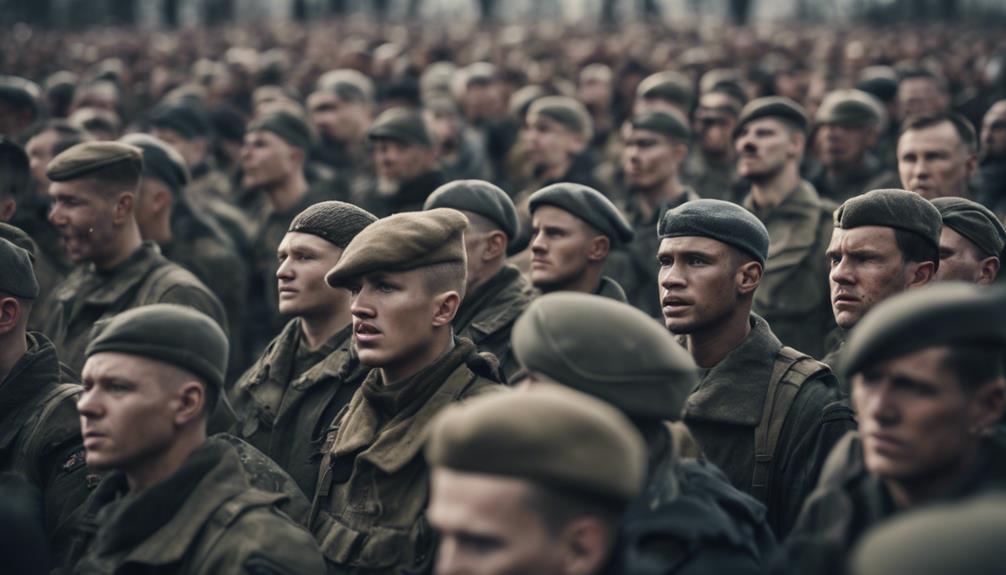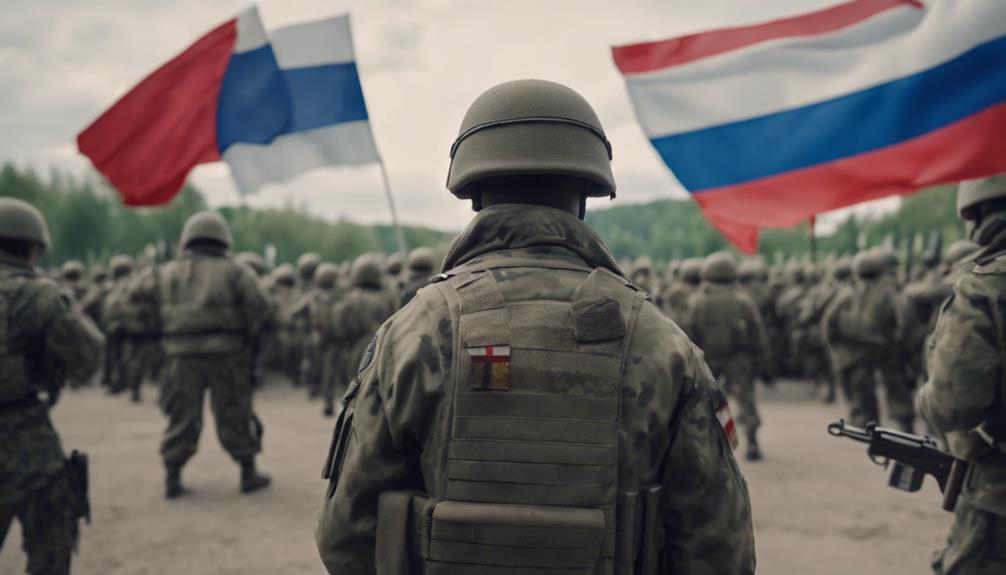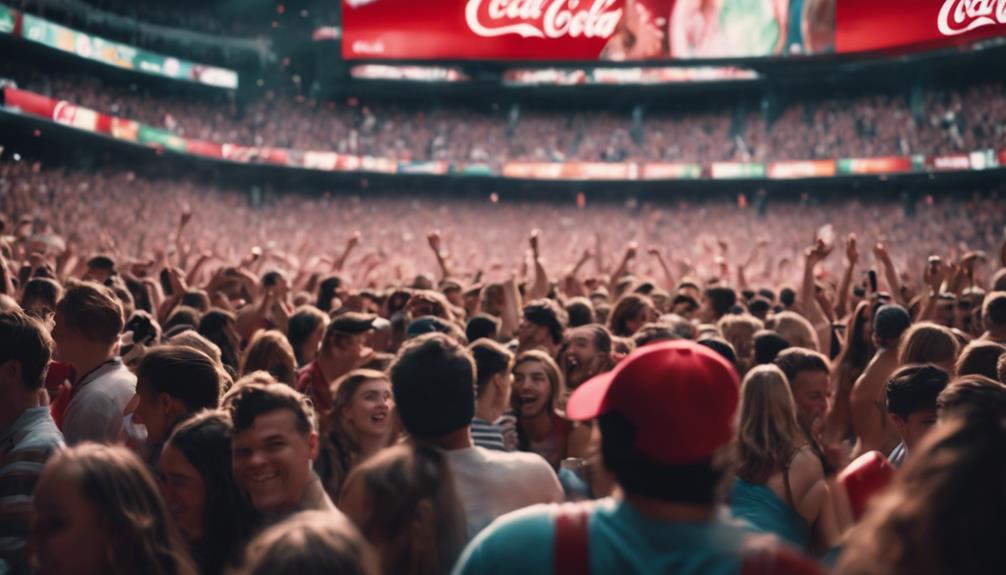Facebook currently allows posts containing violent speech directed at Russian soldiers in specific countries. This adjustment in policy is a response to the ongoing conflict in Ukraine. It permits content advocating harm towards Russian soldiers and even allows calls for the death of President Putin and President Lukashenko in certain regions. Countries like Ukraine, Russia, Poland, and others are included in this temporary permission for such content. This change introduces exceptions within Facebook's typical content guidelines, reflecting a departure from its usual stance on moderation. For more insights on this temporary policy shift, further details can be explored.
Key Takeaways
- Facebook's temporary policy permits violent speech against Russian soldiers in specific regions.
- Calls for harm or death of Russian President Putin and Belarusian President Lukashenko are allowed.
- Countries like Ukraine, Russia, and Poland are included in the temporary policy changes.
- The policy exceptions are in response to the conflict between Russia and Ukraine.
- Moderators are briefed on the context surrounding hate speech and violence targeting Russian soldiers.
Facebook's Stance on Violent Speech
In response to the conflict in Ukraine, Facebook has temporarily adjusted its policy to allow posts calling for violence against Russian soldiers in specific regions. This change includes permitting calls for the death of Russian President Putin and Belarusian President Lukashenko in certain areas. The allowance for such violent political expression is a direct response to the Russian invasion of Ukraine, as highlighted by Meta's spokesperson.
Countries like Ukraine, Russia, Poland, and others have been included in this temporary permission for content that deviates from Facebook's usual community standards and moderation guidelines.
This adjustment in policy marks a significant departure from Facebook's typical stance on violent speech. By permitting posts that call for violence against Russian soldiers, Facebook is maneuvering through a complex landscape of geopolitical tensions and balancing the principles of free expression with the need to address the ongoing conflict in Ukraine. The platform's decision has sparked discussions about the limits of online speech and the responsibilities of social media companies during times of international crisis.
Social Media Moderation Challenges

Traversing the landscape of social media moderation poses significant challenges amid the geopolitical tensions surrounding the conflict in Ukraine. Facebook and Instagram's decision to temporarily allow posts containing violent speech targeting Russian soldiers in specific countries due to the ongoing conflict has highlighted the complexities of moderating online content.
The temporary policy change, aimed at facilitating political expression related to the conflict, introduces exceptions within the usual content guidelines. This allowance includes countries directly involved in the conflict, such as Ukraine, Russia, Poland, and others. Moderators have been briefed on the nuanced context surrounding these exceptions, particularly concerning hate speech and violence directed at Russian soldiers.
Balancing the need to uphold community standards while considering the unique circumstances of the conflict presents a formidable challenge for social media platforms. As they navigate these murky waters, ensuring that such allowances don't escalate tensions or incite further violence becomes paramount in maintaining a responsible online environment.
Impact on Online Discourse

Facebook's temporary policy shift permitting violent speech targeting Russian soldiers in certain regions like Ukraine, Russia, and Poland has sparked concerns over the escalation of hate speech online.
This relaxation of rules raises questions about the global ramifications of allowing such discourse to proliferate unchecked.
The impact on online discourse could have far-reaching consequences, shaping public opinion and influencing attitudes towards the ongoing conflict.
Escalation of Hate Speech
Amid the ongoing conflict in Ukraine, the surge in hate speech online is greatly impacting the quality of discourse. Facebook and Instagram have implemented temporary policy changes allowing posts with violent speech towards Russian soldiers in specific regions affected by the conflict.
Users in countries like Ukraine, Russia, and Poland can now post content that includes calls for harm or death of Russian soldiers or politicians, as long as there are no direct threats or indicators of credibility. This escalation of hate speech, prompted by the conflict in Ukraine, challenges the usual content moderation standards.
Meta's spokesperson, Andy Stone, clarified that these exceptions are a direct response to the Russian invasion of Ukraine. The updated community standards outline the regions where these temporary policy changes apply, shedding light on the complexities faced by platforms in moderating content during times of heightened tensions and conflicts.
Global Political Ramifications
The global political ramifications of Facebook's temporary policy changes allowing violent speech towards Russian soldiers in specific conflict-affected countries are reshaping online discourse dynamics. This decision by Meta comes in response to the Russian invasion of Ukraine, leading to exceptions in the platform's community standards. While the allowance for such content is limited to specific regions like Ukraine, Russia, Poland, and others, it is important to note that credible calls for violence against Russian civilians remain prohibited. This shift marks a significant departure from Facebook's usual stance on moderation and underscores the direct impact of ongoing geopolitical events on online discourse. To explore further into the implications of this policy change, the table below outlines key aspects related to the global political ramifications of permitting violent speech towards Russian soldiers in certain countries:
| Aspect | Description | Impact |
|---|---|---|
| Online Discourse | Shift in the tone and content of discussions surrounding the conflict | Polarization of opinions |
| Geopolitical Events | Influence of real-world events on digital platforms | Blurring of boundaries between online and offline narratives |
| Community Standards | Flexibility in enforcing guidelines based on specific contexts | Potential challenges in consistent moderation |
| Global Political Ramifications | Alteration of diplomatic relations and international perceptions due to online expression | Repercussions on foreign policy decisions |
Tech Companies' Role in Conflicts

Tech companies play a significant role in conflicts by shaping social media moderation policies that influence online discourse during crises. Their ethical responsibility in tech is highlighted through decisions like Meta's temporary policy changes to allow certain forms of political expression amid the conflict in Ukraine.
As Silicon Valley companies face pressure to take a stand against Russian actions, their involvement in global conflicts underscores the impact of their content moderation practices on geopolitical issues.
Tech Companies and Conflicts
Facing challenges with content moderation in times of conflict, major tech companies are making pivotal decisions impacting their stance on violent speech towards Russian soldiers. In response to the conflict in Ukraine, tech giants like Facebook have temporarily allowed posts containing violent speech towards Russian soldiers in specific countries, highlighting the complexities of enforcing hate speech policies during times of conflict.
Meta's struggle with content moderation has come to the forefront, with the company facing scrutiny over its allowances and context considerations in the midst of the crisis. The decision by Apple and Microsoft to halt sales in Russia, along with Cogent Communications terminating contracts with Russian customers, underscores the broader impact of tech companies on conflicts.
Meanwhile, Russia's actions, such as blocking Facebook access and silencing opposition voices, further demonstrate the intertwined relationship between tech platforms and ongoing conflicts like the Russia-Ukraine war. As these tech companies navigate content restrictions and conflict dynamics, their choices carry significant implications for the digital landscape and global discourse.
Social Media Moderation
Managing content moderation in times of conflict, major tech companies are reassessing their role in addressing violent speech on social media platforms. Facebook and Instagram have implemented temporary policy changes allowing posts calling for harm to Russian soldiers or politicians in specific countries affected by the conflict. Meta's spokesperson Andy Stone attributes this decision to the Russian invasion of Ukraine. The exceptions to restrictions on violent speech apply to countries like Ukraine, Russia, Poland, and others. These adjustments in content moderation policies reflect a recognition of the unique challenges posed by hate speech and violent expressions during conflicts. Facebook has updated its community standards to adapt to the complexities of regulating content in times of conflict. This evolving approach underscores the importance of tech companies in maneuvering the ethical and practical considerations of managing online discourse during periods of heightened conflict.
| Violent Speech Allowance | Specific Countries Included | Reason for Temporary Policy Changes |
|---|---|---|
| Yes | Ukraine, Russia, Poland | Russian invasion of Ukraine |
Ethical Responsibility in Tech
Amidst global conflicts, the ethical obligations of technology companies in managing content moderation have come under intense scrutiny. Tech companies, including Facebook, are facing ethical dilemmas regarding their role in overseeing content during situations like the Russian invasion of Ukraine.
Facebook's recent temporary policy changes have allowed for posts containing violent speech directed at Russian soldiers in specific countries affected by the conflict. This decision to permit such content has sparked a debate on the balance between freedom of expression and the prevention of harm.
Meta's involvement in allowing these posts sheds light on the challenges tech companies face when dealing with complex ethical issues during times of crisis. The controversy surrounding Facebook's policy adjustments underscores the broader conversation about the ethical responsibilities of tech platforms in the midst of global conflicts.
As these discussions continue, the tech industry faces increasing pressure to address these ethical dilemmas while upholding the values of safety, respect, and responsible content moderation.
Balancing Freedom of Expression

When considering the allowance for violent speech towards Russian soldiers on Facebook and Instagram, a delicate balance must be maintained between freedom of expression and the constraints imposed by hate speech regulations during times of conflict.
The context of the current situation, where these platforms have temporarily permitted posts inciting harm against Russian soldiers in specific countries affected by the conflict, raises important questions about the boundaries of expression versus the need to curb hate speech.
While users can currently post content advocating for violence against Russian military personnel and politicians without immediate repercussions, this exception is a targeted response to the ongoing Russian invasion of Ukraine.
The specific countries included in this policy change, such as Ukraine, Russia, Poland, and others, reflect the nuanced approach platforms like Facebook are taking to navigate the complexities of allowing political expression while adhering to hate speech regulations during times of heightened global tension.
Balancing these freedoms with responsible content moderation remains a critical challenge in the digital age.
Hate Speech Debates Reignited

Facebook's recent allowance for violent speech targeting Russian soldiers in specific regions has reignited debates on hate speech and platform responsibility.
The impact of such speech on the conflict in Ukraine and the broader implications for online discourse are key points of contention.
As users navigate the blurred lines between political expression and hate speech, the discussions surrounding the ethical and moral responsibilities of social media platforms gain renewed significance.
Violent Speech Impact
The allowance of violent speech targeting Russian soldiers on Facebook has sparked renewed debates on the impact of hate speech and the boundaries of free expression online. This exception to hate speech rules, permitting calls for harm or death specifically towards Russian military personnel, has raised concerns about the impact of allowing violent speech on social media platforms amid ongoing conflicts.
Meta's decision on violent speech reignites discussions about the delicate balance between freedom of expression and harmful content. The complexities tech companies face in content moderation during times of crisis are highlighted by this policy change. Critics argue that permitting violent speech could contribute to escalating tensions and inciting real-world violence.
As social media platforms play an increasingly prominent role in shaping public discourse, the implications of such decisions are significant. The ongoing debates underscore the need for careful consideration of the consequences of allowing violent speech and the responsibilities of platforms to maintain a safe online environment.
Platform Responsibility
Amidst the ongoing debates surrounding the allowance of violent speech targeting Russian soldiers on Facebook, the focus now shifts to the implications of platform responsibility in regulating hate speech.
With Facebook's temporary allowance for posts inciting violence against Russian soldiers in countries affected by the conflict, questions arise regarding the balance between freedom of expression and the platform's duty to prevent harm.
The decision to make exceptions to hate speech rules reflects the challenges of content moderation in times of heightened tension and conflict. By adjusting its community standards to accommodate the complexities of the current situation in eastern Europe and the Caucasus, Facebook acknowledges the need for a nuanced approach to managing violent speech.
The platform's role in facilitating discussions while safeguarding against the incitement of violence raises important considerations about the responsibility of tech companies in times of crisis.
As discussions on platform responsibility continue, the evolving landscape of content moderation in conflict settings underscores the challenges of upholding community standards while addressing sensitive geopolitical issues.
Global Crisis Complexities

Handling the intricacies of the current global crisis requires a delicate balance between political expression and hate speech regulations. In response to the ongoing conflict in Ukraine, Facebook has made temporary policy exceptions to allow posts with violent speech towards Russian soldiers in specific countries.
These nuanced approaches aim to navigate the complexities of the global crisis while upholding community standards. The policy changes in Facebook's community standards, which have evolved since 2018, reflect the platform's adaptability to address the challenges posed by the current crisis.
By permitting content that calls for harm or death to Russian soldiers and politicians in countries such as Ukraine, Russia, and Poland, without requiring threats or credibility indicators, Facebook is treading a fine line between allowing political expression and preventing hate speech.
This strategic decision underscores the platform's commitment to adapting its policies to suit the ever-changing landscape of global conflicts.
Facebook's Temporary Exceptions

In response to the Russian invasion of Ukraine, Facebook and Instagram have implemented temporary policy exceptions allowing content that typically violates community standards in specific countries. These temporary changes are in direct response to the ongoing conflict and are currently applicable in countries like Ukraine, Russia, Poland, and others.
Meta spokesperson Andy Stone has emphasized that there's an allowance for violent political expression within these countries, as long as there are no credible threats involved. To manage this, Facebook moderators have been given temporary instructions regarding exceptions for violent speech targeting Russian soldiers or related to the invasion of Ukraine.
The policy adjustments include carve-outs and exceptions specifically tailored to address cases of hate speech and violence within the context of the current situation. These measures aim to strike a balance between facilitating discussions related to the conflict and maintaining a safe online environment.
Addressing Speech Towards Russian Soldiers

The management of content related to speech targeting Russian soldiers on Facebook and Instagram has undergone temporary policy adjustments in response to the conflict in Ukraine.
In addressing speech towards Russian soldiers, the platforms now allow posts containing violent speech in specific countries like Ukraine, Russia, and Poland. Users are permitted to express calls for harm or death towards Russian soldiers or politicians without the usual requirement of credible threats or indicators of credibility.
These policy modifications have been implemented as a response to the ongoing conflict, leading to exceptions in content moderation practices that emphasize the importance of contextual understanding in evaluating such posts.
The temporary allowance for violent political expression represents a deviation from the typical enforcement of hate speech rules, highlighting the platforms' responsiveness to the unique circumstances presented by the conflict.
Debates on Platform Responsibility

Amidst the evolving landscape of content moderation and geopolitical tensions, the responsibility of platforms like Facebook and Instagram is increasingly scrutinized in the ongoing debates on platform responsibility.
With Meta's temporary policy changes allowing posts containing violent speech towards Russian soldiers in specific countries such as Ukraine and Poland, the intersection of political expression and hate speech regulations comes to the forefront. These exceptions, while not permitting calls for violence against Russian civilians, aim to navigate the delicate balance between upholding free speech and preventing the incitement of violence.
As tech companies like Meta grapple with the challenges of content moderation during global conflicts like the Russia-Ukraine war, questions surrounding platform responsibility become more complex.
The debates around how platforms handle violent speech, particularly in the context of international conflicts, highlight the need for clear and consistent policies that address the nuances of political expression while upholding community standards and safety measures.
Online Speech in Times of Conflict

During times of conflict, managing online speech becomes increasingly intricate as platforms like Facebook and Instagram adapt their policies to address the evolving geopolitical landscape. The recent allowance for posts containing violent speech targeting Russian soldiers or politicians in specific countries affected by the conflict highlights the nuanced nature of moderating content during such sensitive periods. Here are some key points to take into account:
- Context is Vital: Understanding the context of the conflict is essential when determining the appropriateness of content, including violent speech.
- Conflict-Specific Policies: Platforms may implement specific policies for countries directly involved in the conflict, as seen with the temporary allowance for certain types of violent speech.
- Community Standards Adaptation: Facebook's community standards have been adjusted to accommodate the unique circumstances of the ongoing conflict, emphasizing the need for flexibility in content moderation.
- Temporary Exceptions: Content moderators have been provided with temporary guidelines regarding exceptions to the usual restrictions on violent speech, reflecting the platform's responsiveness to current events.
Real-World Implications of Online Content

Understanding the impact of online content on real-world scenarios poses a complex challenge in today's digital domain. Meta's temporary policy changes allow credible calls for harm or death of Russian soldiers or politicians in specific countries affected by the conflict in Ukraine. These exceptions to community standards highlight the evolving content moderation practices employed during crises, emphasizing the need for context-specific guidelines for moderators. In response to the unique circumstances surrounding the conflict, Facebook has established specific guidelines for moderators to navigate the acceptance of content targeting Russian soldiers, considering factors like context and credibility.
| Implications of Online Content |
|---|
| Complex challenge in digital landscape |
| Temporary policy changes for specific countries |
| Guidelines for moderators on violent speech |
The decision to allow violent speech that would typically violate community standards underscores the importance of considering the context of the Ukraine conflict in shaping temporary policy changes within the digital content moderation field.
Violent Speech in Specific Countries

Facebook's policy adjustments in specific countries like Ukraine, Russia, and Poland allow for posts advocating harm or death towards Russian soldiers or politicians amidst the ongoing conflict. This temporary policy change permits users to post content inciting violence against Russian soldiers without the need for threats or indicators of credibility. The exceptions in community standards are a specific response to the Russian invasion of Ukraine, as clarified by Meta spokesperson Andy Stone. These policy adjustments, which have been updated since their initial publication in 2018, apply only to users in certain regions. Facebook's moderators have received temporary instructions allowing for exceptions to the usual content restrictions regarding violent speech in the context of the conflict.
- Facebook's policy adjustments in select countries permit posts advocating harm or death towards Russian soldiers.
- The temporary policy change allows for content inciting violence without the usual criteria for removal.
- The exceptions in community standards are a direct response to the Russian invasion of Ukraine.
- These adjustments are region-specific and have been updated since 2018.
Facebook's Controversial Decision

Facebook's controversial decision to temporarily allow violent speech targeting Russian soldiers has sparked significant debate. This move raises concerns about the platform's responsibility in regulating harmful content and the potential impact on users exposed to such content.
The allowance for violent speech in specific countries like Ukraine and Russia brings to light complex issues surrounding freedom of expression and the ethical considerations of online platforms.
Violent Speech Allowance
In response to the Russian invasion of Ukraine, Facebook and Instagram are currently permitting posts that incite violence against Russian soldiers in select regions. This temporary allowance is a departure from the platforms' usual hate speech policy and comes as a response to the ongoing conflict. Here are some key points to bear in mind:
- Meta spokesperson Andy Stone has linked this policy exception directly to the Russian invasion of Ukraine, indicating a nuanced response to the current crisis.
- Users in specific regions, such as Ukraine, Russia, and Poland, can now post content advocating for the death of Russian soldiers or politicians without facing immediate removal.
- Facebook's community standards have been adjusted to accommodate the sensitive nature of the conflict, marking a significant departure from the last public update in 2018.
- The decision to allow violent speech in certain contexts reflects the platforms' efforts to navigate the complexities of a rapidly evolving geopolitical situation while balancing freedom of expression with the need to maintain community standards.
Impact on Users
The controversial decision by Facebook to temporarily allow violent speech against Russian soldiers and politicians has sparked significant discussions regarding its impact on users. This temporary allowance for posts inciting violence in specific countries like Ukraine, Russia, and Poland raises concerns about the potential consequences within these communities.
While Facebook aims to navigate the complexities of the ongoing conflict by adjusting its community standards, permitting such extreme political expressions may have ripple effects on user interactions and perceptions.
Users engaging in this discourse may feel a sense of empowerment or validation for their views, potentially leading to further polarization and division within these regions. Additionally, the normalization of violent rhetoric could desensitize individuals to the gravity of such statements, impacting the overall tone and atmosphere of online discussions.
As Facebook treads carefully in balancing free expression with responsible content moderation, the implications of this decision on user behavior and community dynamics remain under scrutiny.
Platform Responsibility
Amidst the ongoing conflict between Russia and Ukraine, the management of the social media platform to allow posts advocating violence against Russian soldiers and politicians has raised concerns about its platform responsibility.
This move stems from Facebook's temporary allowances for political expression, permitting calls for violence against Russian soldiers and leaders in specific regions affected by the conflict with Ukraine. The exception to the hate speech policy, allowing calls for death to Russian President Putin and Belarusian President Lukashenko, has drawn attention to the delicate balance between political expression and the regulation of hate speech.
The decision has sparked mixed reactions, with some supporting the freedom of expression it allows in certain contexts, while others express concerns about the potential harm of permitting violent speech on the platform.
In addressing these complex issues, Facebook faces scrutiny over its platform responsibility and the impact of its policies on political discourse and societal well-being.
Critiques on Social Media Allowances

Occasionally, critics question the ethical implications of social media platforms allowing posts inciting violence towards specific groups during times of conflict. In the case of the Russian invasion of Ukraine, Facebook and Instagram have implemented temporary policy changes that permit political expression that would typically violate hate speech policy pertaining to violence against Russian civilians. These exceptions enable users in certain countries affected by the conflict to make credible calls for violence against Russian soldiers, deviating from the usual rules outlined in Facebook's community standards.
The decision to relax these restrictions in regions like Ukraine, Russia, Poland, and others has sparked debates about the fine line between free expression and promoting harm. While some argue that such allowances are necessary during times of heightened tension, others raise concerns about the potential consequences of normalizing violent rhetoric on social media platforms. These critiques highlight the challenges faced by companies like Meta in balancing the principles of free speech with the need to prevent real-world harm in conflict situations.
Frequently Asked Questions
Is Facebook Blocked in Russia?
While Facebook is blocked in Russia in response to perceived restrictions on Russian media, it's essential to clarify that this action isn't related to the platform permitting violent speech towards Russian soldiers in specific countries. The block stems from broader geopolitical tensions and concerns over media freedom.
Russia has taken measures to restrict access to Facebook and Twitter during the conflict, leading to accusations of incitement of hatred towards Russians by the Russian Embassy.
Why Was Instagram Banned in Russia?
Instagram was banned in Russia due to the government's perception of restrictions on Russian media. The ban was part of broader measures against social media platforms during the conflict in Ukraine. This action highlighted tensions between the Russian government and major tech companies.
The ban on Instagram, following similar actions against Facebook and Twitter, was a response to escalating geopolitical tensions. The restrictions underscored the complex relationship between governments and social media platforms during times of conflict.
Can Russians Use Social Media?
Russians currently face social media restrictions due to the government blocking platforms like Facebook. This action limits user access and communication.
While Facebook has allowed posts targeting Russian soldiers in specific countries, Russian users can't engage as the platform is banned.
The conflict has resulted in challenges for Russians using social media, impacting their ability to connect and share online.
Is Meta Banned in Russia?
Meta, the parent company of Facebook, hasn't been banned in Russia as of the latest available information. While tensions exist between Meta and Russian authorities over content policies, no official ban on Meta products has been reported.
The situation remains dynamic, with ongoing discussions and potential changes in response to evolving circumstances. It's advisable to refer to verified sources for the most up-to-date information regarding Meta's status in Russia.
Conclusion
To sum up, Facebook's decision to allow posts with violent speech towards Russian soldiers in specific countries has sparked controversy and raised concerns about the role of tech companies in conflicts.
This move symbolizes a delicate balance between freedom of expression and responsible content moderation.
It underscores the importance of ethical considerations in online discourse and the need for platforms to carefully navigate complex geopolitical dynamics.










